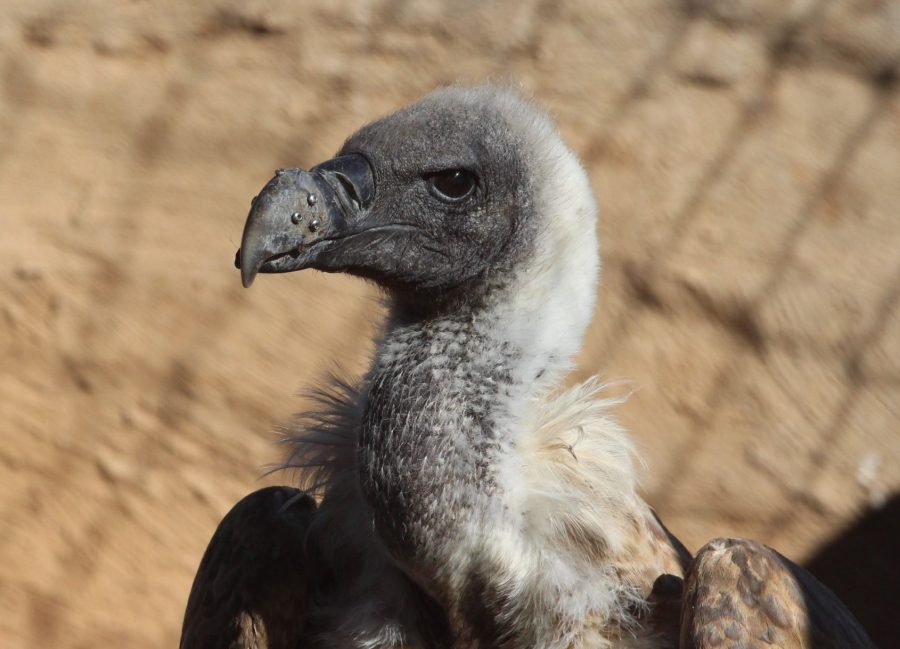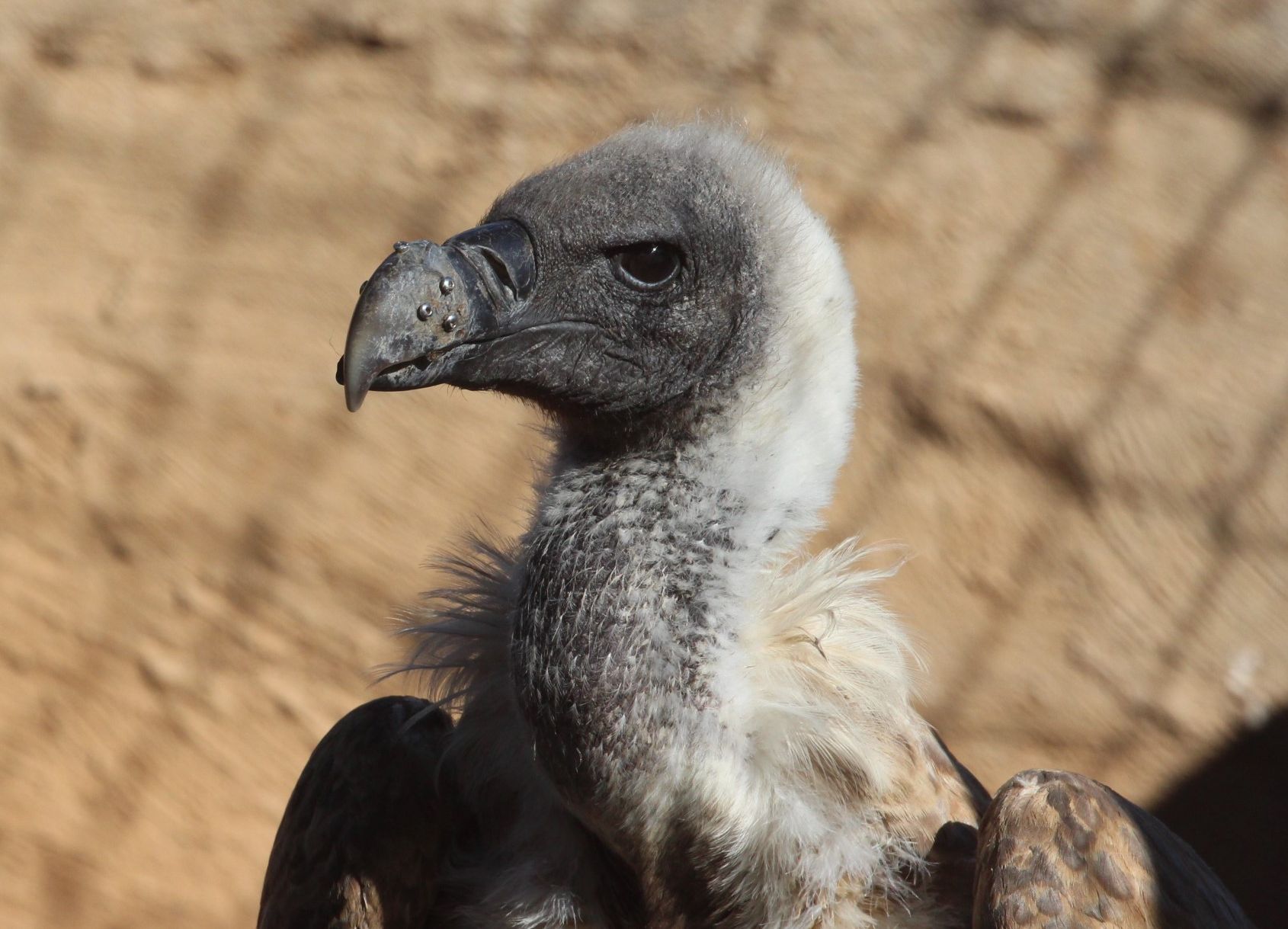
Starving vulture undergoes world first beak transplant after car crash in South Africa
A starving vulture has undergone the world’s first ever beak transplant on a bird of prey, and can now feed again – after its own beak was crushed in a car crash in South Africa. After surgery the vulture was left looking like an “extra” straight out of a Mad Max movie, with the beak […]

A starving vulture has undergone the world’s first ever beak transplant on a bird of prey, and can now feed again – after its own beak was crushed in a car crash in South Africa.

After surgery the vulture was left looking like an “extra” straight out of a Mad Max movie, with the beak of a deceased vulture screwed onto its own badly damaged one.
The stricken scavenger had been rushed into a South Africa conservation centre close to death, having lost its left eye and the iconic hooked beak that it needs to feed daily in the car crash.
The incredible photos on this page reveal how top wildlife vet Professor Katja Koeppel, 45, has given the battered bird a second chance at life after her pioneering operation worked.


The procedure of transplanting a dead bird’s beak onto a living bird’s beak is thought to have been done only once before and that was on a duck in New Zealand.
But that injured mallard’s new beak only had to cope with digesting soft earthworms, watery pondweed and tadpoles, whereas the vulture’s was a much tougher proposition.
To survive with its new “bionic beak” she would have to be able to tackle devouring fresh meat and ripping strips of flesh off carcasses while in competition with others.
Parrots and macaws have been fitted in the past with titanium prosthetic bills to replace their own broken beaks but two efforts to repeat that method with the vulture failed.

So Dr Koeppel – an Associate Professor with the University of Pretoria’s Faculty of Veterinary Science – had to create a unique transplant that would stand the test of time.
German born Katja said:
“This unfortunate White Backed Vulture had been badly hit by a car and its beak had been crushed; and without a new beak it would starve to death.
“She had been brought into us by the vulture conservation centre VulPro to see if there was any way the important hooked section of the beak could be rebuilt to save her.
“We tried twice with prosthetic acrylic beaks but they were not strong enough and tore off when she was feeding so we had to come up with a plan thinking outside the box.
“We had a dead White Backed Vulture in the laboratory freezer for research purposes so we sawed a piece of its beak off that would match the hooked bit of the missing beak.
“Then we used 6 strong orthopaedic screws to secure the beak from the dead bird to the broken beak beneath and we are delighted it has so far lasted a month.”
In an unusual twist, vet Katja explains that bird beaks are made of keratin which is the same protein found in rhinoceros horns and human fingernails, and grows back.
So the transplanted beak will act as a protective shield so that the broken original beak can grow back underneath… yet meantime the bird is still able to feed and live normally.
Vet Katja said:
“It will take a year perhaps but in time the original will grow back fully beneath the transplanted beak, which will then be cut off at the right time,.
“Because she was blinded in one eye in the crash and because of her transplanted beak she will need constant monitoring so can’t be released back into the wild.
“We hope she will find a mate at the VulPro conservation centre and if she does produce chicks they will be released into the wild to preserve the species.”
The beak transplant took Dr Koeppel and her team 30 minutes and for a bird of prey it is thought to be a world first and will help other vultures in the future.

White-backed vultures are in severe decline from the 270,000 in Southern Africa in 1992 to the estimated 40,000 today, and are classed as highly endangered.

The injured vulture – who will be given a name when a sponsor takes her on and chooses one – was injured in a crash in Coligny in North West Province in March.
Chief Executive Officer Kerri Wolter of VulPro said “the vulture is recovering well in a compound. She will have to sadly remain in captivity forever due to her injuries but will have a happy life and she is currently eating meat that has been sliced up for her. But in time we hope she will move onto eating from carcasses with her new beak but it is a case of wait and see, and everyone has their fingers crossed.”

Kerri set up the charity, which has nine staff, in 2007 and it has 100 injured vultures pass through each year… of which 60% are safely released back in the wild.
Most of the injuries are severely broken wings from power-lines or hitting wind turbines, but all nine species of vulture in South Africa are now in severe decline.
Reasons include reduction of wildlife areas and also secondary poisoning where farmers kill predators like foxes, jackals and caracals who prey on their stock.
The vultures then eat the poisoned animals once they have died and with it they consume the very poison that killed those animals, and as a result die in large numbers themselves.
Vultures are powerful birds with massive wingspans. They spend the days aloft riding thermals in search of carrion such as zebras or antelope to feast upon.
The scavengers are important to the eco system as they clean the carcasses using their large hooked beaks to reduce the rotting flesh to just bones in hours.

By removing the meat from the decomposing carcasses vultures do the crucial work of clearing up after death, thus preventing the spread of deadly diseases.
White backed vultures weigh up to 7kg’s and are 40 inches long and boast a wingspan of up to 8 feet as they soar over the savannah below looking for kills.
Vultures have always had a bad reputation with their big, ungainly wings and hooked beaks and being labelled the harbingers of death circling over anything dying below.
But Kerri said: “They are wonderful birds and seriously endangered and under threat every day, and our team is doing everything we can to help injured vultures get back into the wild”.
If you wish to help with the rehabilitation of Kerri’s vultures and help save the nine species of vulture her team rescues, visit this link and click DONATE WWW.VULPRO.COM
To use any of the text or photos, please contact Jamie Pyatt News Ltd: jamiepyatt@hotmail.com or call +27 64 100 8975
